Team Ineos and the Giro d'Italia: The highs and lows since 2010
Charting the British team's relationship with the Italian race
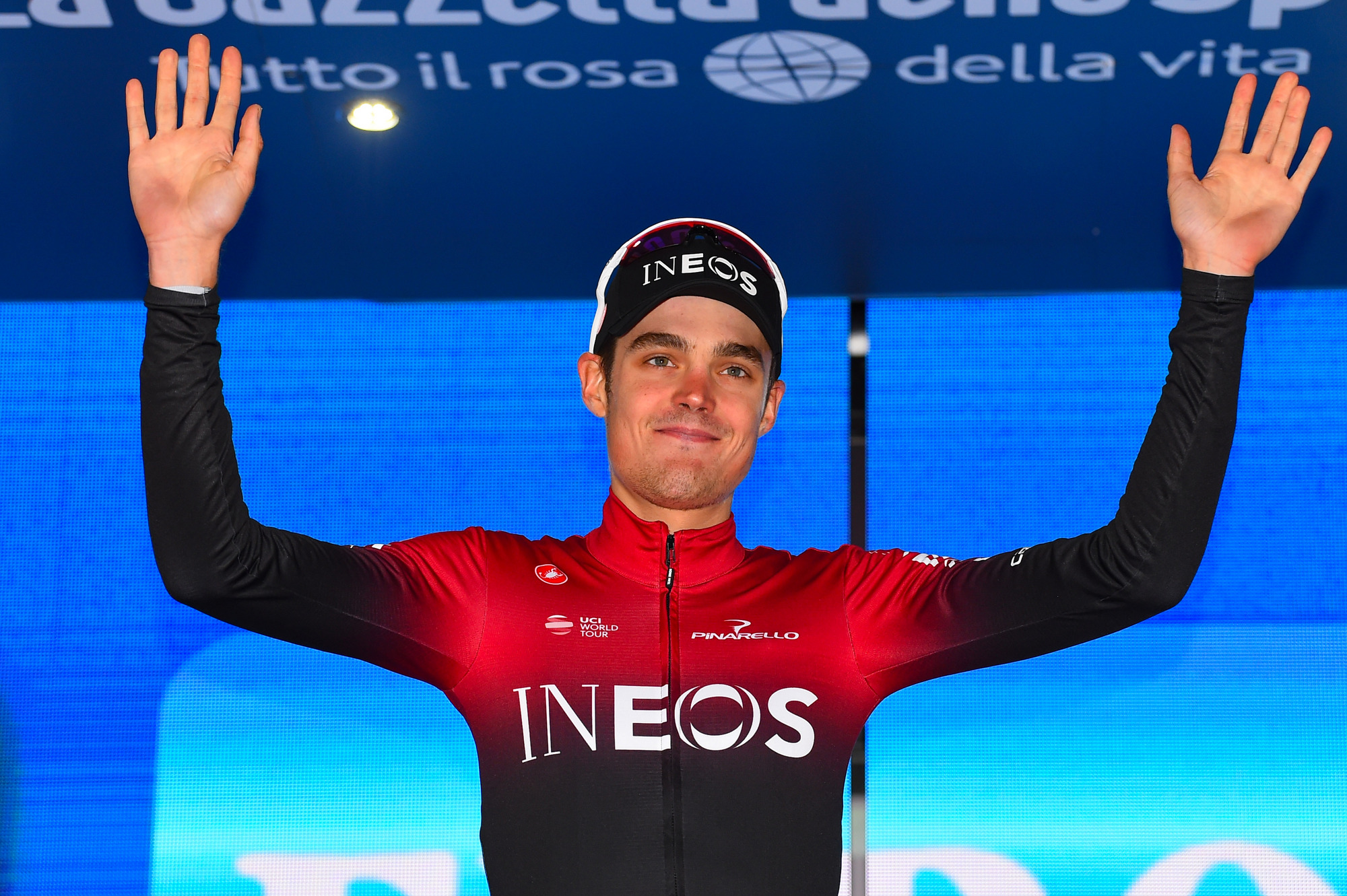
Cyclingnews takes a look back at what was for Team Sky a troubled relationship with the Giro d'Italia – until Chris Froome's overall victory there in 2018. As Team Ineos in 2019, it was once again back to the drawing board after Egan Bernal crashed in training ahead of the race, but the British team's other young guns nevertheless got their opportunity to shine, and the future looks bright.
Youthful Team Ineos squad secures top-10 finish for Sivakov at Giro d'Italia
Giro d'Italia: Chris Froome takes a third straight Grand Tour victory
Giro d'Italia: Chris Froome conquers Monte Zoncolan
Nieve saves Team Sky's Giro d'Italia with mountains classification victory
Giro d'Italia: Thomas, Landa & Yates crash en route to Blockhaus
Team Sky pick up the pieces as Giro d'Italia hopes take a battering
Thomas abandons the Giro d'Italia
Cioni praises Landa for saving Team Sky's Giro d'Italia
In stark contrast to their fortunes at the Tour de France – where Team Sky/Ineos have won seven times in the past eight years – the British team had a rough time at the Giro for many years, with crashes, abandons, disqualifications and time penalties all enhancing the race's reputation as the unruly cousin of the more orderly Tour.
Starting in 2010 and in the team's first season and first Grand Tour, Cyclingnews charts the team's fortunes over the following decade.
2010: A flash of pink
Sky's first taste of the Giro – their first taste of Grand Tour racing – could not be sweeter. Bradley Wiggins triumphs on the short opening time trial in Amsterdam and pulls on the first maglia rosa of the race.
After the first high comes the first low. On the flat first road stage, still on Dutch soil, Wiggins is involved in a mass pile-up before being caught up in another crash seven kilometres from the finish, causing him to lose the pink jersey.
Wiggins begins to shed time on the aggressive stage 7 and that trend continues – even on the next individual time trial – as he insists his primary focus is July's Tour de France.
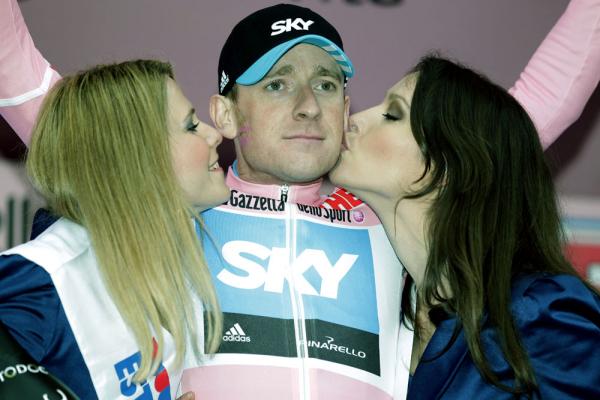
Greg Henderson bags a second-place finish on stage 12 but Sky come out of the race with little else. In fact there's embarrassment late on as Chris Froome is disqualified for holding onto a motorbike on the Mortirolo on stage 19.
Get The Leadout Newsletter
The latest race content, interviews, features, reviews and expert buying guides, direct to your inbox!
2011: An uneventful affair
Team Sky's 2011 Giro d'Italia is a relatively uneventful affair. Swede Thomas Lofkvist is their nominated leader, having worn the race leader's jersey for a single day in the 2009 edition although he is far from a favourite. He eventually finished 21st that year, following the removal of a handful of riders from the overall classification, and this time his result is exactly the same, although his proximity to the race winner is four minutes closer.
Davide Appollonio brings the team closest to success with a second place to Mark Cavendish on stage 12. He also nets a handful of other top 10 finishes before abandoning en-route to the Grossglockner on stage 13. Sky also make it into a few breaks with Lars Petter Nordhaug and Russell Downing but they ultimately leave the race empty-handed.
2012: Cavendish's triple
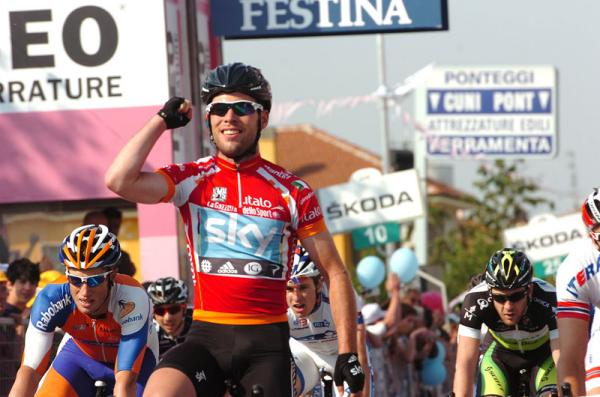
New signing and world champion Mark Cavendish is the fulcrum of Sky's plans for the Giro, having won two stages followed by five at the Tour last year.
Geraint Thomas is a close second to Taylor Phinney on the opening prologue in Denmark, but it's Cavendish who gets off the mark at the first time of asking on the opening road stage, comfortably winning a reduced bunch sprint after a messy finale.
A late crash sees Cavendish forced to see former teammate Matt Goss take the following stage, but he gets his revenge once the race hits Italian soil. The Manxman makes it a hattrick on stage 12, with a stunning demonstration of his ability to plot his way through a hectic sprint.
While Cavendish doesn't win again, the team's pair of young Colombians, Sergio Henao and Rigoberto Uran, quietly go about their business, riding themselves into the top 10 overall. Grand Tour debutant Henao rides with impressive assuredness, knocking on the door of the top 5 until stage 16 sees him lose time and Uran move up. The race concludes with Uran seventh and Henao ninth, with Thomas once again second against the clock.
2013: Misery for Wiggins
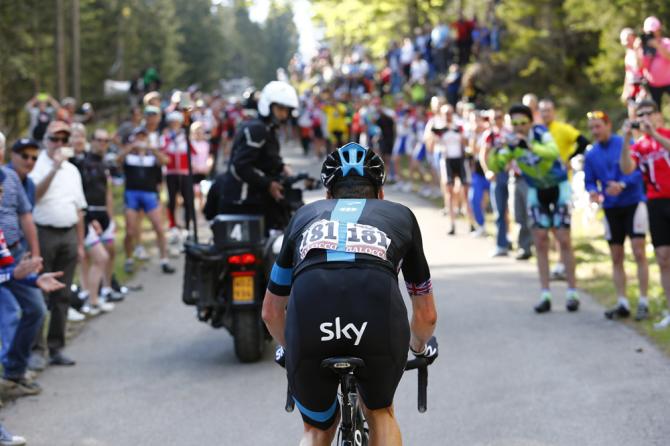
It looks like Chris Froome will lead Sky at the Tour de France so Wiggins, the reigning Tour champion, goes into the Giro as one of the big favourites.
Things look positive early on when Sky claim the team time trial by nine seconds over Movistar. It puts Salvatore Puccio into pink, for a day, and Bradley Wiggins into the driving seat in the general classification.
However, he runs into trouble early on as it transpires that the Italian Grand Tour breeds a chaos far removed from the methodical calm that characterised his Tour victory. A crash on stage 3 forces him into a frantic chase while a late spill the following day sees him lose 17 seconds.
The heavens open on stage 7 and, while Vincenzo Nibali gives it hell for leather, Wiggins slides out half-way down a late descent and proceeds to take the rest of it at a snail's pace. He loses 1:24 to the main favourites.
The long stage 8 time trial is supposed to be where Wiggins lays his foundations for overall victory, but he finds himself with ground to make up. A puncture, hampers his progress and he only manages to put eight seconds into Nibali – a big blow to his chances.
Stage 9 sees more cautious descending, with many pundits saying the Brit has lost his bottle, and the situation goes from bad to worse the next day with the first summit finish. Suffering with a chest infection, Wiggins loses close to a minute on the steep finish at Altopiano del Montasio. Not a disaster, in the circumstances, but there is a silver lining for Sky as Rigoberto Uran skips away to take a fine stage win and move to third on GC.
Wiggins' miserable Giro features one final setback on the flat stage 12, as he's unable to hold the pace on the run-in to the finish. He loses over three minutes and does not start the next stage.
Uran loses time to Nibali as the Italian stamps his authority on the race in the mountains, but the Colombian reaches Brescia as the best of the rest.
2014: Cataldo's Cima Coppi the sole reward
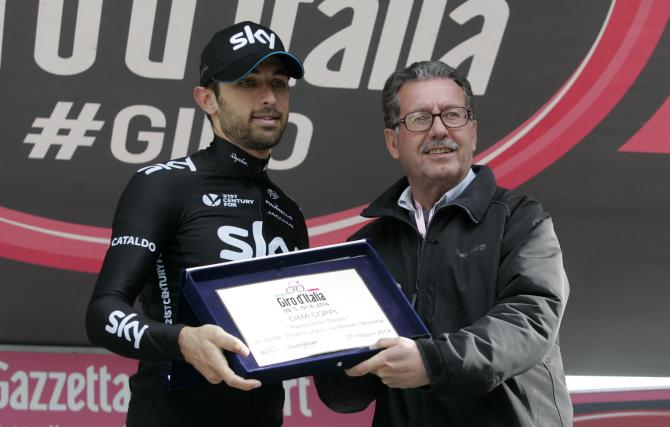
Sky go into the Giro without a true overall contender, after the departure of Rigoberto Uran over the winter. They do have some options in the mountains, however, with Dario Cataldo and Philip Deignan on their roster, while Edvald Boasson Hagen and Ben Swift are on the hunt for sprint victories.
After winning the team time trial the year before, there is disappointment when they can only manage sixth. Swift takes second on the streets of Dublin two days later in the final stage of the Irish Grande Partenza, while Boasson Hagen takes sixth. Swift goes on to score a few more top 10 placings but it proves to be the best day for the sprint line-up. Boasson Hagen quits the race ahead of stage 16, while Swift plugs onto Trieste and finishes fifth in the points classification.
On a now infamous stage 16 to Val Martello/Martellal, Cataldo battles through the snow and makes it into the breakaway. He strikes out alone on the Stelvio and crests it first to take the Cima Coppi prize although he finishes more than 10 minutes down on the stage winner Quintana. Deignan puts on an aggressive performance in the final week and comes close to netting a stage win on stage 18 but doesn't have the legs to match the Colombian pairing of Julian Arredondo and Fabio Duarte.
Cataldo, who had finished 13th in 2011, is the rider with the most pedigree in the general classification but it's 20-year-old neo-pro Sebastian Henao who secures the team's best placing with 22nd, almost an hour behind winner Nairo Quintana.
2015: Porte's ordeal
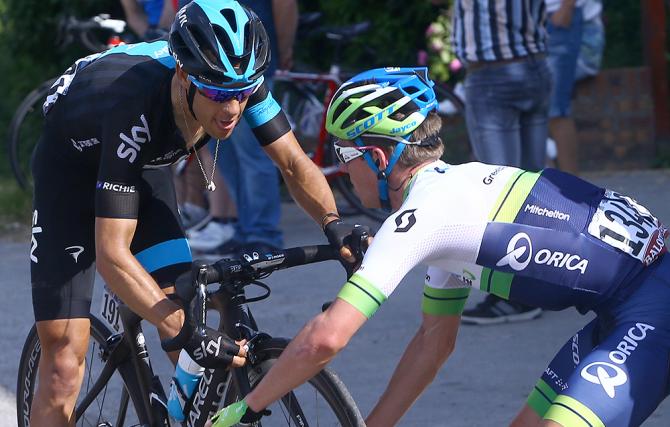
Richie Porte, central to Bradley Wiggins' and Chris Froome's Tour victories, gets his shot at Grand Tour team leadership. The Australian is a bona fide favourite, given the rich vein of form in the early part of the season that has seen him win Paris-Nice, the Volta a Catalunya, and the Giro del Trentino back-to-back.
However, suspicions that Porte lacks the ability to put everything together consistently over three weeks are borne out. The Australian has a really promising opening week, sitting third overall, but then come a series of setbacks. He loses time late on stage 10 and is infamously docked two minutes for an illegal wheel change with compatriot Simon Clarke.
More time is lost as he is once again caught up in a late crash en route to Jesolo - which leaves him with an injured hip and knee - before a hugely disappointing time trial to Valdobbiadene leaves his overall prospects looking decidedly bleak. Stage 15 proves to be the final straw as Porte loses 27 minutes in the mountains and abandons the next morning.
Sky's Giro is far from a complete disaster, however, as Elia Viviani takes his first Grand Tour stage win on stage 2, enjoying a lengthy spell in the red jersey before eventually ceding it to Giacomo Nizzolo. Elsewhere, new signing Leopold Konig comes into his own with a string of top-10 placings in the mountains that see him finish the race sixth overall.
2016: Landa's abandon
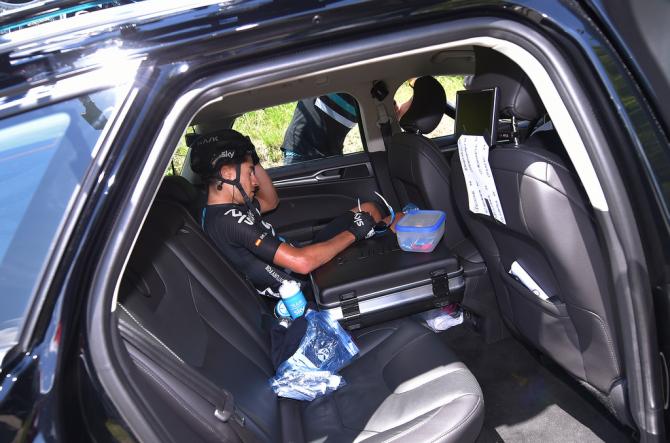
Sky have high hopes for its marquee signing Mikel Landa going into the 2016 Giro d'Italia. In 2015, the Spaniard proved himself with two stage wins and third place overall while riding in support of Astana teammate Fabio Aru.
The opening week is largely one for the sprinters and punchuers with Landa taking advantage of the slightly uphill finish in Praia a Mare to move up to 16th on GC. He improves one place two days later at the finish in Roccaraso. The uphill finish to Arezzo looks like being the undoing of Landa as he loses contact with his GC rivals but a late revival sees him recover to finish eighth and move up to 10th overall ahead of the decisive Chianti time trial.
Landa's Achilles heel in 2015 was the testing Treviso to Valdobbiadene time trial that all but ended his GC aspirations. With low expectations ahead of the Chianti time trial, Landa puts in a surprising performance to finish 20th and rise to eighth in the standings.
Sky's Giro demons return after the rest day as Landa struggles from the gun, getting dropped on the first climb of the day. Viral gastroenteritis is given as the reason for Landa's abandon as he suffers an ignominious departure and Sky's failure at the Giro continues.
Mikel Nieve wins a stage at Cividale del Friuli in the third week. His win puts him into contention for the KOM jersey, and on stage 20 he seals the classification. In the GC, Sebastián Henao is the best place Sky rider almost 40 minutes down on winner Vincenzo Nibali (Astana).
2017: Motorbike madness
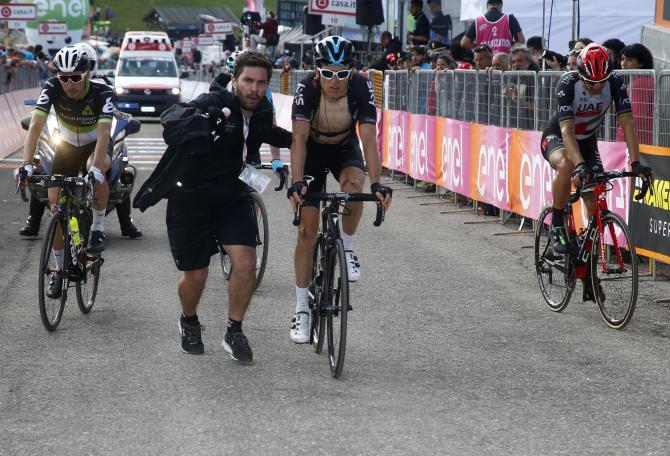
Sky head into the 2017 Giro with two leaders in Geraint Thomas and Mikel Landa, but both are wiped out by a freak accident involving a motorbike on stage 9.
Thomas is leading Sky at a Grand Tour for the first time, and hopes are high after he finished fifth at Tirreno-Adriatico and won the Tour of the Alps in the preceding weeks. Meanwhile Landa gives the team versatility and a different card to play in the mountains. Thomas sits second overall heading into stage 9, the first crucial summit finish of the race, with Landa four seconds back with the majority of the GC favourites.
Yet they hadn't even hit the Blockhaus ascent before things are thrown into disarray. Wilco Kelderman collides with a police motorbike that is inexplicably parked at the side of the road and Thomas and Landa are both involved in the ensuing pile-up.
It is immediately clear that Landa's maglia rosa hopes are over as he soft-pedals up the mountain and loses 27 minutes, but Thomas 'pops' his dislocated shoulder back in and forges on in a desperate attempt to limit his losses. He crosses the line over five minutes down on stage winner Nairo Quintana. It looks like Thomas might dig in and relaunch a bid for the top five as he finishes a remarkable second place in the stage 10 time trial, but he loses time on the following two stages, with pain in his shoulder and knee, and he does not start stage 13.
There is consolation for Sky as Landa goes on the rampage in the second half of the race. No longer a threat to the GC men, the Spaniard gets himself into breaks time and again on the mountain stages and, after finishing third on stage 14 and second on stage 16, he finally claims his victory on stage 19. That wraps up the mountains jersey, so Sky do at least have something to show for a Giro that once again veered wildly from the script they'd written.
2018: Froome makes history
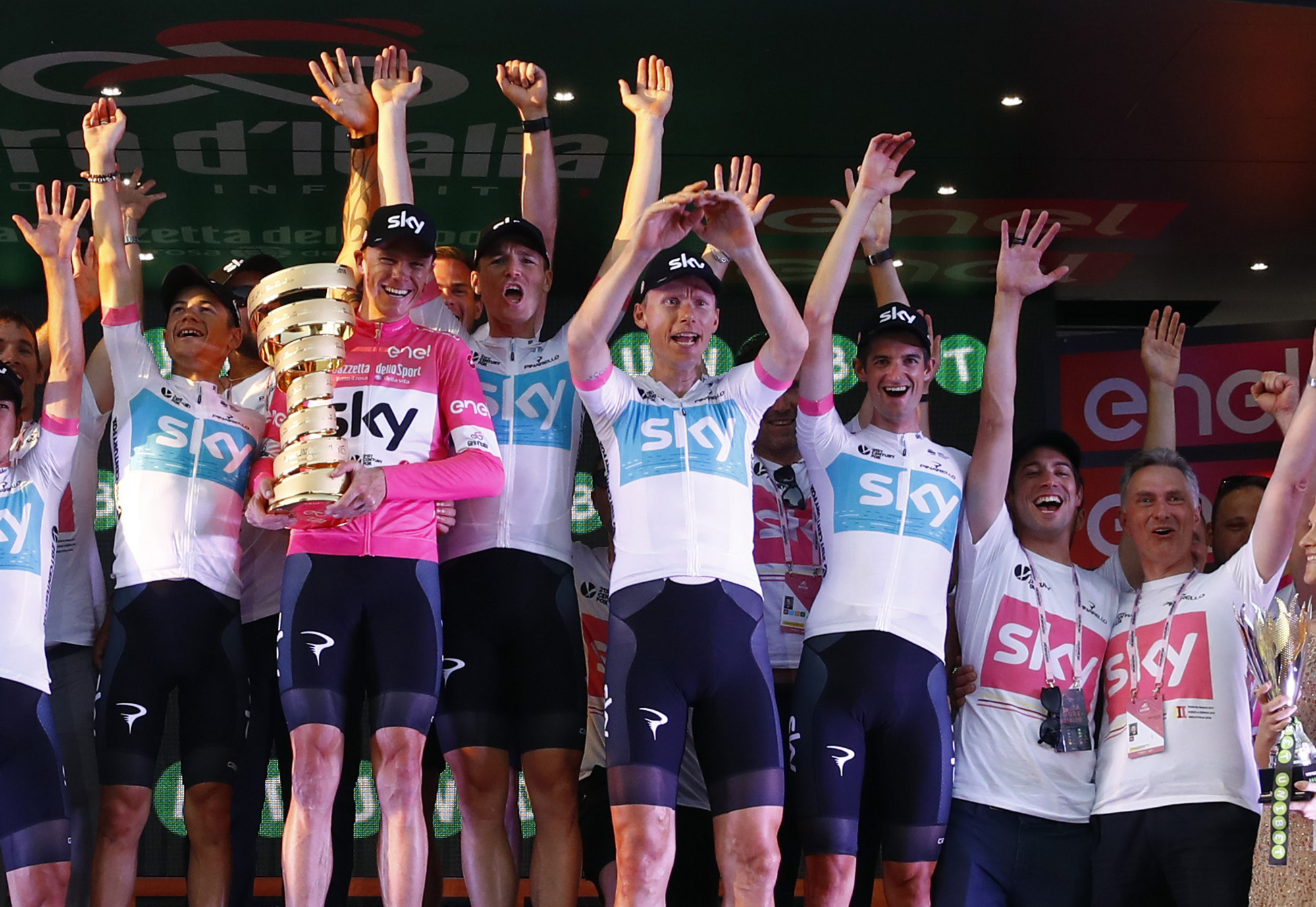
After winning the Tour de France and Vuelta a España in 2017, Chris Froome leads the line at the 2018 Giro for the first time. He goes into the race with his salbutamol case ongoing, and question marks surrounding the potential validity of his eventual result.
It's a rough start, as Froome crashes heavily in the warm-up for the opening time trial and goes on to put in a subdued display. He loses more seconds in a late hold-up on stage 4 and, despite holding his own on the first summit finish on Mount Etna, hits the deck again on the uphill finish on stage 8. Worse is to come on stage 9 as he finishes way off the pace at Gran Sasso d'Italia, losing more than a minute to Mitchelton-Scott's Simon Yates and the other faovurites. Going into the second week 11th overall, 2:27 on Yates, he declares it "unlikely" he'll win the Giro.
That prediction looks well founded as he ships another 40 seconds on the punchy Osimo finish on stage 11 but then suddenly, as the race heads for the high mountains with a summit finish on the mighty Monte Zoncolan, we see a new Froome. He attacks on the double-digit gradients four kilometres from the summit and, despite a spirited chase from Yates, holds on for his first Giro stage victory and puts around 40 seconds into Sunweb's Tom Dumoulin and FDJ's Thibaut Pinot.
The turnaround, however, is short-lived, as Froome seemingly pays for his efforts on the road to Sappada the following day, where a swashbuckling Yates wins again. Froome ships 90 seconds to Yates and 50 to the rest of his rivals, ending the second week seventh overall, nearly five minutes down.
Froome starts the final week with a solid enough time trial – 13 seconds behind Dumoulin but a minute up on Yates. A trio of mountain stages conclude the race and it's on the first, to Prato Nevoso, where Yates shows his first signs of weakness as Froome is equal to the rest.
Stage 19, though, is where the Giro turns on its head, and where Froome produces one of the most sensational solos in Grand Tour history. Attacking on the dirt roads of the Colle delle Finestre, Froome takes flight some 80km from the line and is never seen again. Yates completely cracks, while Dumoulin and Pinot, in a group with Pinot's teammate Sebastian Reichenbach, lose more and more ground on the subsequent climbs and valleys. Froome wins the stage at a distance of three minutes and pulls on the maglia rosa in one of the most dramatic Grand Tour comebacks of all time.
He then weathers the final mountain stage to Cervinia with the help of his team and is crowned Giro champion in Rome the next day. He therefore enters the history books as the seventh rider to win all three Grand Tours and the third to hold all three titles simultaneously. With the salbutamol case still up in the air, and with his Finestre raid greeted with scepticisim, he says: "I have an absolutely clear conscience, and I have no doubt this result will stand the test of time."
2019: Young guns given freedom

When, last July, Egan Bernal became the youngest winner of the Tour de France in more than 100 years, it's easy to forget that he wasn't meant to be there in the first place. Both Bernal and what was now Team Ineos will look back at that simple twist of fate as a kind one, even if it did leave them rudderless at the Giro.
After the precocious Colombian fractures his collarbone ahead of the race, Ineos are left with a young squad with ample opportunity, but little responsibility or expectation. Leading the line are the dynamic duo of Pavel Sivakov and Tao Geoghegan Hart, who had combined to entertaining effect to put Bahrain Merida's Vincenzo Nibali to the sword and take the top two podium spots at the Tour of the Alps, a fortnight ahead of the Giro.
It was Sivakov who stood on the top step in the Alps, but it seems Geoghegan Hart might be the leading light at the Giro as he places seventh in the opening time trial, nearly half a minute ahead of Sivakov. However, that momentum is quickly curtailed as the Briton hits the deck twice on stage 3, shipping 90 seconds and suffering a debilitating blow to his knee. Despite a resilient showing in the stage 9 time trial, more bad luck is around the corner as he crashes again on stage 13 and leaves the race with a broken collarbone.
Sivakov, meanwhile, goes from strength to strength after a shaky first week. He places in the top 10 on the mountain stages to Lagu Serru and Courmayeur to head into the final week ninth overall and wearing the white jersey as best young rider. That final week, however, begins with the 'queen stage', and a struggling Sivakov, dropped on the Mortirolo, is forced to hand the white jersey to Astana's Miguel Angel Lopez. The Ineos rider digs in for the rest of the week and, largely yo-yoing off the back of the group of favourites, riding at his own tempo even when the rest accelerate, manages to seal a ninth place finish in Verona.
Sivakov pays tribute to his teammates, who he says rode for him as if they were defending the pink jersey. It's not what the team envisaged at the start of the year, and the likes of Bernal and UAE Team Emirates sensation Tadej Pogacar have since recalibrated our expectations of young riders, but Sivakov's second Grand Tour was nevertheless a small success story.
Patrick is a freelance sports writer and editor. He’s an NCTJ-accredited journalist with a bachelor’s degree in modern languages (French and Spanish). Patrick worked full-time at Cyclingnews for eight years between 2015 and 2023, latterly as Deputy Editor.
